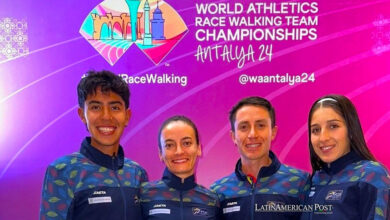Fixing in Soccer: Scandals Break Out in the World of Sports
Latin American, Asian, European, and North American sports are affected by internal agents. How did they corrupt it, and what can be done to eradicate fixing matches in soccer?.

Photo: Pixabay
LatinAmerican Post | Javier Aldana
Listen to this article
Leer en español: Amaños en el fútbol: estallan escándalos en el mundo del deporte
Match-fixing is an illegal practice that has been present in the sport almost since its creation. This consists of altering the development or result of a match in an illegitimate way with deliberate actions and omitting responsibilities. This, driven by an economic benefit through criminal organizations that operate in betting houses, or by a sports benefit that guarantees advantages within soccer competitions.
Soccer is one of the sports that is most at risk of being fixed due to its popularity. Lately, a series of scandals around the world have been uncovered, in which the 'beautiful sport' was dotted with different arrangements. What happened in each case and how is match-fixing being combated?
Players in Brazil, possibly at the service of a criminal gang
Investigations by Brazilian prosecutors uncovered a match-fixing scheme in different categories of soccer in this country, including the highest competition: the Brasileirao 2022. Initially, the second division club Vila Nova de Goías denounced possible fraud, which is why it was created Operation Maximum Penalty in November 2022. There, conversations of several players with a criminal gang that generated profits through online betting were found.
The players involved, who were removed under suspicion, are Eduardo Bauermann from Santos; Nino Paraíba from America MG; Richard del Cruzeiro; Pedrinho and the Ecuadorian Bryan García from Athletico Paranaense; and Vitor Mendes from Fluminense. These join the already investigated Víctor Ramos from Chapecoense; Igor Cariús from Sport; Gabriel Tota from Ypiringa; Argentine Kevin Lomónaco from Bragantino; and Jesús Trindade and Alef Manga from Coritiba.
Likewise, the Brazilian soccer player Max Alves would also be involved, despite playing for the Colorado Rapids of the United States MLS. There, the Latin American was excluded by his club while the competition deepens the investigations that began to produce results in April 2023. The operation established that these players allegedly received between 10,000 and 20,000 dollars for guaranteeing game actions such as yellow or red cards and corner kicks, among others. For this reason, it is estimated that the players could serve a sentence of six years in prison.
Fixing matches in the semi-professional division of Spain
The fifth level of Spanish soccer, called the Third Federation, was allegedly a place of fixing with profits in sports betting. There, the CD Huracán Melilla would have arranged matches under the instructions of its president Felipe Heredia. Firstly, the first round match of the Copa del Rey in the 2021-2022 season was called into question, in which Levante thrashed CD Huracán Melilla 8-0.
For this reason, investigations began by the authorities and control entities, which progressed towards three games of the 2022-2023 season: against UD Maracena, against Huétor Vega and against Arenas Armilla. Finally, Felipe Heredia and a soccer field worker were arrested in early June 2023.
Fixing scandal in Hong Kong
Eleven players and a coach from the Hong Kong professional league were arrested in May 2023 on charges of match-fixing. According to the local press, they would be members of Happy Valley, a historic club in their league with more than 70 years of existence. Similarly, it is estimated that each member received between 1,200 and 1,300 euros per match rigged. For this reason, the Hong Kong Independent Commission Against Corruption (ICAC) advanced with investigations and deployed an operation, in which 23 people were arrested.
Serious accusations of fixing games in Colombian soccer
Doubts arose in the second division of Colombian soccer when Alejandro Guerrero, technical director of Boca Juniors de Cali, denounced possible manipulations by his own players in May 2023. There, the coach stated that from Dimayor and the Federation a statement was sent to the club's managers stating that irregular situations had been evidenced since 2018, for which reason investigations will be launched against all members of the club. However, Dimayor sanctioned Alejandro Guerrero for his complaint with five weeks without being able to exercise and with a fine that exceeds thirteen million Colombian pesos.
On the other hand, an anonymous source decided to denounce the fixing and sports betting by a couple of players from the Colombian promotion tournament, according to Publimetro. There, the informant assured that these players bet on game actions such as the number of corner kicks, whether both teams score or not, or the number of goals in the match. Finally, these players act deliberately in the match to make it possible to collect the bet.
How is fixing in soccer being combated?
The first measure to fight against match-fixing is to toughen punishments and penalties: from prison measures, through fines and disqualifications, to sporting punishments such as relegation. For its part, FIFA maintains in its 2023 disciplinary code that people who are involved in the illegal manipulation of matches or competitions will be sanctioned with at least a two-year ban from engaging in soccer-related activities. Likewise, they will be creditors of a minimum fine of approximately $110,000 dollars. In the most serious cases, the sanctions can be for life.
You can also read: Premier League Strikes a Blow Against Sports Betting
For their part, competitions such as La Liga manage work plans focused on integrity workshops with players, coaches and managers, in which the criminal and administrative consequences are explained. On the other hand, La Liga has Tyche 3.0 technology capable of analyzing abnormal behavior in bookmakers. Consequently, it is capable of detecting risky matches that are subsequently reported to the authorities, who monitor the match and warn the clubs involved.
Finally, La Liga has collaboration agreements with bookmakers to detect atypical movements or matches and notify the competition or the authorities. Fixing in sport is as old as the creation of disciplines, so hard work is expected to investigate, detect and punish all the agents involved in soccer corruption around the world.



